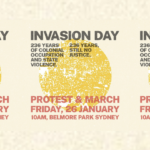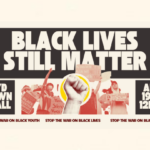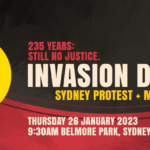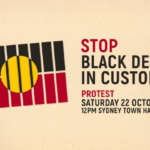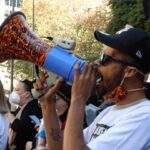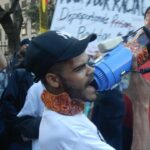“Important to Stand with Us”: Dunghutti Activist Paul Silva on Rallying for First Nations Justice
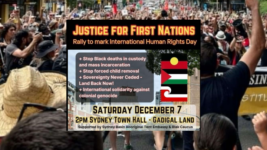
The last 14 months around the globe have been marked by the horrors of the Israeli-perpetrated genocide in Gaza and also the rising realisation that western forces that have committed mass destruction upon Indigenous peoples in the past continue to support this bloody pursuit by others.
Despite the wholesale mass killing that humanity has borne witness to over live streaming feeds on their devices, this past year has too been notable due to the growing wave of Indigenous uprisings calling out colonial oppressors in an effort to wrench back the right to self-determination.
The global awakening of the Free Palestine movement has been a key part of this. Led by Indigenous Palestinians and non-Zionist Jewish people, this movement has formed a substantial drive to see an end to Israeli apartheid and the occupation of Palestinian people.
The uprising of the Kanaky people against their French oppressors in so-called New Caledonia commencing earlier this year is ongoing. There has been the rising up of the Māori people in New Zealand parliament and on the streets of Aotearoa, against ultraconservative political forces.
And on this continent too, Gunnai, Gunditjmara and Djab Wurrung Senator Lidia Thorpe called out king Charles III on his illegitimate claim to rule over First Peoples here, and she then went on to deny the Australian parliamentary censure against her.
Rally on Gadigal
The Blak Caucus and the Sydney Basin Aboriginal Tent Embassy are holding the Justice for First Nations rally on International Human Rights Day, which is meeting at 2 pm on Gadigal Country at Sydney Town Hall on Saturday 7 December.
Those rallying to mark Human Rights Day are raising the point that despite living under the imposed tutelage of the Australian government, which is a party to all the major international human rights treaties, those in power consistently deny First Peoples their basic rights.
This oppression is part of the ongoing colonial settler project on this continent, which includes a range of social, political and economic issues that organisers assert serve the same genocidal intent as first invasion, whether that be via deaths in custody, forced child removals or land seizures.
“Fossil fuel mining and other destructive development on unceded Aboriginal lands is driving a worldwide climate crisis,” rally organisers state ahead of the event.
“Australia – built on First Nations genocide – is actively supporting the genocide of Palestinian people”, as it continues to trade with Israel, as well as to provide diplomatic support to the Zionist state.
For his people
Dunghutti man Paul Silva is one of the organisers of the First Nations justice rally. Silva has been an ardent activist campaigning for the rights of First Peoples, ever since he lost his uncle David Dungay Junior on 29 December 2015, when specialty prison guards at Long Bay killed him.
Sydney Criminal Lawyers spoke to Silva about the form of the Albanese government when it comes to Indigenous affairs, the need to show international solidarity with Indigenous people subjected to genocide around the globe, along with the need for the non-Indigenous to join the cause.
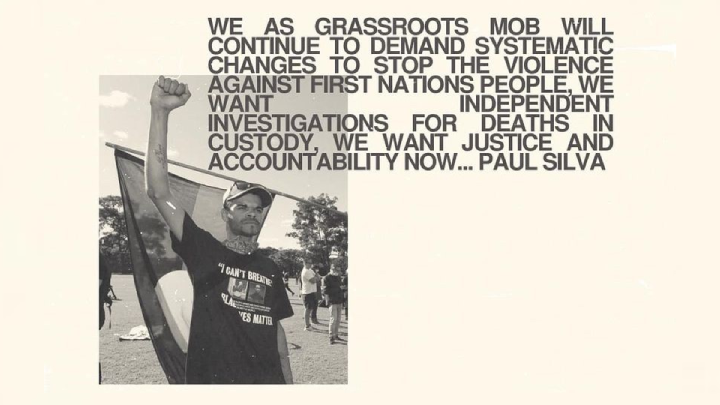
The Blak Caucus and the Sydney Basin Aboriginal Tent Embassy are hosting the Justice for First Nations rally to mark International Human Rights Day in early December.
Paul, the Albanese government came to office promising to champion First Nations justice in mid-2022, and it went on to hold the Voice referendum. However, since the unsuccessful vote, federal Labor has gone silent on Indigenous affairs.
How would you describe the approach of the current government to First Nations?
A number of First Nations issues have not been addressed under this government. The Indigenous incarceration rate is at an all-time high under this government.
Any governance operating on stolen land is not going to benefit First Nations people. I’m a firm believer in land back with First Nations governance and law. That’s the big part of Closing the Gap.
The reality is that no matter what Australian government is in place, First Nations people will be exposed to corruption and intergenerational trauma will be ongoing.
As you’ve said, a key issue that organisers are seeking to raise on 7 December is the state of Indigenous incarceration in Australia.
Over the last decade, this situation has only gotten worse to the point that 35 percent of adult prisoners are now First Nations people, with more than 50 percent of youths in prison being Aboriginal kids as well.
In your opinion, why, when there has been so much of a focus upon this issue, are rates of First Nations imprisonment only growing? What does this say about the Australian criminal justice system?
The statistics speak for themselves. Systematic racism plays a big part within these allegations towards First Nations people. This is the prime example of living Blak in Australia, as First Nations people here are always targeted.
We must take into account those people who are in custody who have not even been found criminally at fault by a NSW or any Australian court.
So, the reality is the colour of our skin is seen as a threat. The statistics show that.
Further, you’ve been a vocal campaigner against the crisis in Blak deaths in custody in this country. And its recently come to light that in the first 11 months of this year, 22 Aboriginal people have died in the custody of police or corrections.
What are your thoughts on this toll having now surpassed 580 Indigenous deaths since the Royal Commission handed down its final report in 1991?
This is the reason for the call to action, not just for Indigenous people but non-Indigenous people too, as well as Palestinian and Māori mob, as this is a prime example of how these people continue to get away with the killing and murder of our people.
There have been 22 Aboriginal deaths in custody over the year and that’s distressing for the families and the communities involved.
Unfortunately, the process in regard to having people held accountable in relation to causing these deaths needs to be reevaluated and reformed.
This is systemic racism once again impacting our people. This is the way the system attempts to get rid of us. As First Nations people, we know that the First Fleet tried to wipe us out when they arrived.
I’ve been saying, over the last 10 years I’ve been active, that deaths in custody are similar to the Stolen Generation, and instead of doing it in mass numbers, they’re doing it behind closed doors, using a system that allows them to get away with these deaths.
In Australia, several individuals have now been charged over Aboriginal deaths in custody, although none of them have been found guilty of the crime.
This is another example of the failure, not just of the coronial process, but also the criminal court process, once these people are actually charged with these murders.
For me, in having a connection to an Aboriginal death in custody, the rally to mark International Human Rights Day for First Nations people is important and it’s important for families that have recently gone through these events.
That’s whether they’re dealing with a death in custody, a forced child removal or they’re up against fracking or mining on their land: there comes a time when First Nations people need to stand up for what is right.
In March last year, the Minns government announced a crackdown on youth crime, which always disproportionately impacts upon Aboriginal youth.
Since then, Victoria announced a youth crime crack down, and now new Liberal governments in the NT and Queensland are throwing the book at youth offenders.
How do organisers of the coming protest consider the issue of rising crack downs on First Nations kids by law enforcement? What long-term issues is this leading to?
Many communities are facing issues with these laws that crack down on youths. It’s a drive to incorporate young Indigenous people into the prison system.
This is their way of attempting to break us as First Nations people. But we’re resistant. We’ve been around for more than 65,000 years.
This is the way the white system – the white construct – targets First Nations people. We’ve been protesting, demanding and fighting for many years, although this has all fallen on deaf ears.
Whatever acts or laws they implement in regard to youth or First Nations people in general, these are processes to attack First Nations and to diminish and to try to see First Nations people extinct.
In regard to youth crime, they’re using their system to target our next generation and traumatising them at a young age and incorporating them into this system.
Advocates have been calling to raise the criminal age of responsibility. I went through an issue recently where I had NSW police officers making comments suggesting they were going to arrest my 6-year-old son.
This is now happening more than ever before. Police are under the assumption that they can arrest anybody regardless of the age of criminal responsibility.
These issues need to be addressed and abolished. Our rights as First Nations people are under attack more than any other group of people in Australia.
Although I do recognise that other people in Australia have their human rights attacked as well, so therefore, it is about time we stand together and unite, to call out the system for what it is.
This government does not benefit First Nations people. It does not benefit the everyday Australian. It only benefits the rich and the famous, while others are brainwashed into thinking it benefits them.
The Justice for First Nations rally has a further focus on showing international solidarity against colonial genocide. What are your thoughts on what’s been happening in Gaza over the last year? How do colonial genocides taking place elsewhere impact locally?
For us, as First Nations people, we are loving, caring and respectful people. Our elders have traded and met with other people prior to colonisation. And we are guided by our elders to stand with people currently facing circumstances such as have been happening in Palestine.
It is distressing to scroll through your feed on Facebook or Instagram and to find videos and content involving young children being killed and families being destroyed.
The everyday Australian citizen needs to come to realise that this is what they are supporting via the government that they have voted in to power.
This is the government that they are voting in, which continues the genocide not only here but in the homelands of other Indigenous people.
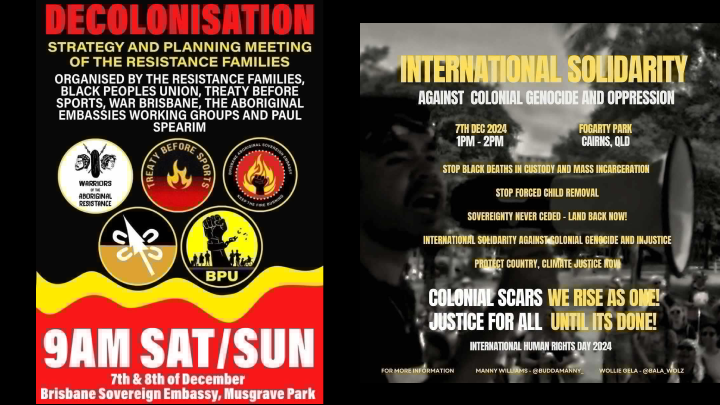
And lastly, Paul, the Justice for First Nations rally will be meeting on Gadigal land at Sydney Town Hall on 7 December. What’s set to take place on that day? Why should people get out and join you?
It is important for First Nations and non-Indigenous people, Palestinians and Māori to stand with us in December to not only acknowledge the genocides that are occupying their lands but also to call out the government here on the systemic issues facing First Nations people.
This has been a long time coming. A lot of non-Indigenous people in the wider community are starting to realise what this government is about.
There will be a number of speakers talking on topics such as the forced removal of First Nations kids, Aboriginal deaths in custody and land rights.
We will have some Palestinian speakers as well, along with some Māori speakers.
It is important for everyday citizens to come out and not only call out the government, but to stand in solidarity with Indigenous people right across the world.
What we are seeing worldwide is the British government – the British construct that currently operates in Australia – supporting the ongoing genocide worldwide.
They supported genocide when they arrived here 250 years ago, and they are still supporting it in this day and age, and honestly, they need to be called out for it, and that is what we are doing.
That’s why we are calling on communities supporting us in Sydney but there’s also been a call out for a National Day of Action.


